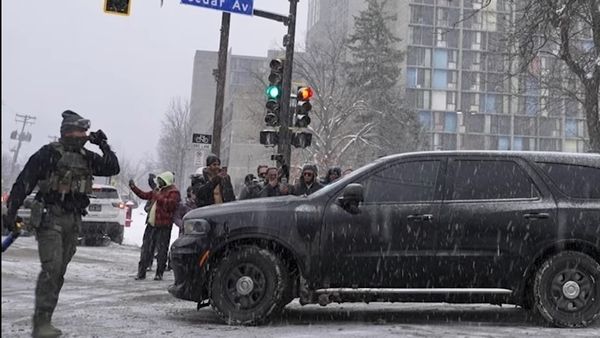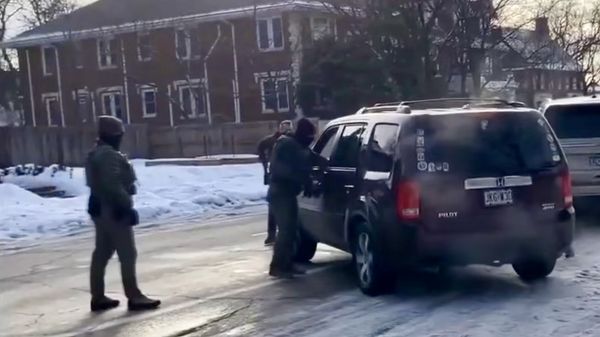
In the early hours of October 1, 2009, villagers in Chhattisgarh’s Gompad woke to the loud sound of firing. Terrified, they ran into the surrounding jungle, seeking refuge.
They returned to find the bodies of family and friends. At least 16 people lay dead and several were injured.
The villagers alleged that it was the security forces who had entered the village and fired on them. The security forces included Salwa Judum, a counterinsurgency militia made up of Adivasi villagers and surrendered Maoists backed by the Indian state.
The Supreme Court would decide otherwise, placing the blame squarely on Maoists. Last month, the court dismissed a petition filed by social activist Himanshu Kumar and 12 villagers seeking an independent investigation into the killings.
Now, a group of villagers are camping out in Delhi to file a review petition against the order.
Newslaundry met the group of 16 Gompad villagers at Hindu Mahasabha Bhawan, Delhi.
Markam Laxmi, an eyewitness to the massacre, said most of the villagers were asleep when they heard the sound of bullets.
“Security forces and Salwa Judum entered our village,” she said. “People ran towards the jungle, some hid in the fields. Salwa Judum people went there and fired on them.”
The bodies of four villagers – Madavi Bajar, Madavi Survi, Katam Karni, Madavi Mutti – were never found, Laxmi said. The forces also burned down at least three houses in the village, she added.
She told the story of infant Kattam Suresh, who was visiting Gompad at the time with his mother. “Salwa Judum members killed his mother and chopped off his fingers,” she said. “They cut his lips and laid him over his mother’s body. They also killed Suresh’s whole maternal family, including his maternal grandparents.”
Suresh, who lost his mother, aunt and grandparents that day, is now 13 years old. He is part of the Gompad contingent in Delhi. Sitting with his father, Katam Dula, he said his father only recently told him how he had lost his fingers.
What did his father tell him? “He said the police chopped off my fingers,” Suresh said.
Himanshu Kumar, who is helping the villagers in their quest for justice, told Newslaundry that at the time of the massacre he was managing an ashram in Nendra village in Dantewada. Days after the incident, he met with villagers from Gompad who told him what had happened.
Kumar helped them file a petition in the Supreme Court on October 27, 2010, where they demanded a CBI inquiry into the massacre. They claimed that similar killings had taken place on September 17 and October 1, 2009 at Gachhanpalli and Belpocha, respectively. Aside from Kumar, there were 12 petitioners, all of whom had lost a relative in the massacre.
The Supreme Court dismissed the petition on July 14, 2022, saying that the allegations against the security forces were insufficient to initiate a CBI inquiry. The court fined Kumar, as the first petitioner, Rs 5 lakh and told him to deposit the amount within four weeks.
The court also noted that, in their statements, the 12 petitioners didn’t say that the security forces had killed their relatives. This, the court said, “demolishes the entire case put up by petitioner no. 1 who is running an NGO”.
Kumar claimed the police had “kidnapped” the petitioners before their statements were recorded in court.
“When I learned about it, I along with Sudha Bharadwaj and other social activists visited the village and villagers told us what had happened,” he said. “Then we brought all those who had lost their family members to Delhi and filed a petition before the Supreme Court. However, when they returned to their village, police kidnapped six of them and kept them in illegal detention.”
During this “illegal detention”, he said, the police “threatened to kill” the petitioners if they made statements against the police or security forces.
“On the basis of these statements by the petitioners, the Supreme Court made its judgement,” Kumar said. “No value should be attached to a statement given by a person in police custody but that’s exactly what happened in this case.”
Two of the petitioners, Sori Sambhu and Muchki Sukri, confirmed to Newslaundry that the Chhattisgarh police had “pressured” them into blaming Maoists for the killings.
Sambhu alleged that her “illegal detention” lasted almost a year. She had suffered a bullet injury in her leg during the massacre and the bullet took a chunk of bone with it. She said the police took her when she returned to Dantewada from Delhi.
Sukri said she was held in Dantewada even before she could go to Delhi to record her statement.
“The police detained me and kept me in Dantewada. They told me to change my statement before the court,” she alleged. “They said, ‘You change your statement and say that Naxalites came and killed the villagers.’ But what I had initially said was the truth. I will never change my statement under any pressure. Why would I defame Naxalites? Salwa Judum killed villagers in front of everyone’s eyes. That is the truth.”
The Supreme Court judgement, however, squarely places the blame on Maoists.
“The materials collected in the form of the chargesheets substantiate the case put up by the respondents that the villagers were attacked and killed by Naxalites,” the judgement reads. “There is not an iota of material figuring in the investigation on the basis of which even a finger can be pointed towards the members of the police force.”
Kumar asked if there had even been an investigation before the Supreme Court passed its verdict.
“The villagers approached the Supreme Court seeking justice,” he said. “They are saying that their family members were killed, the fingers of a little boy were chopped off, his mother, aunt and grandparents were killed, the breasts of a 70-year-old woman were chopped off...A total of 16 people were killed. The villagers only sought an independent inquiry into the killings. How did the Supreme Court judge who gave the verdict come to the conclusion that Maoists killed the villagers? How did the judge know the police were not involved in the killing? Was there any investigation? The police had filed some FIRs against Maoists and the judge is believing the police, whereas the police are the killers in the case.”
Kumar also said he will not pay the Rs 5 lakh costs slapped against him. “Paying the cost would mean I have done something wrong. But I have not,” he said.
Meanwhile, the villagers told Newslaundry that it was, without a shadow of doubt, the security forces who killed their family and friends that day. “We all saw the security forces rampaging through our village and killing villagers,” Sambhu said firmly. “They were not Naxalites.”
Asked about these allegations by Gompad’s villagers and their ongoing protest in Delhi, Bastar’s inspector general of police P Sundarraj said, “A petition was filed in the Supreme Court with regard to the Gompad incident. All concerned parties presented their cases and a decision was awarded. Whether the decision is in our favour or not, we always respect the verdict of the courts…We are committed to the cause of our people.”
Newslaundry is a reader-supported, ad-free, independent news outlet based out of New Delhi. Support their journalism, here.







